外研版小学六年级英语 祈使句
- 格式:pptx
- 大小:467.98 KB
- 文档页数:21
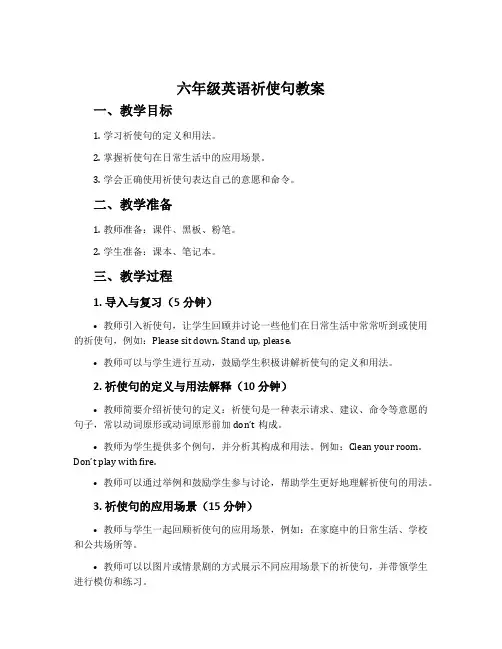
六年级英语祈使句教案一、教学目标1.学习祈使句的定义和用法。
2.掌握祈使句在日常生活中的应用场景。
3.学会正确使用祈使句表达自己的意愿和命令。
二、教学准备1.教师准备:课件、黑板、粉笔。
2.学生准备:课本、笔记本。
三、教学过程1. 导入与复习(5分钟)•教师引入祈使句,让学生回顾并讨论一些他们在日常生活中常常听到或使用的祈使句,例如:Please sit down. Stand up, please.•教师可以与学生进行互动,鼓励学生积极讲解祈使句的定义和用法。
2. 祈使句的定义与用法解释(10分钟)•教师简要介绍祈使句的定义:祈使句是一种表示请求、建议、命令等意愿的句子,常以动词原形或动词原形前加don’t构成。
•教师为学生提供多个例句,并分析其构成和用法。
例如:Clean your room. Don’t play with fire.•教师可以通过举例和鼓励学生参与讨论,帮助学生更好地理解祈使句的用法。
3. 祈使句的应用场景(15分钟)•教师与学生一起回顾祈使句的应用场景,例如:在家庭中的日常生活、学校和公共场所等。
•教师可以以图片或情景剧的方式展示不同应用场景下的祈使句,并带领学生进行模仿和练习。
4. 祈使句的练习与创作(20分钟)•教师为学生提供一些练习题,让学生根据上下文补全祈使句。
例如:____ (close) the door, please.•教师组织学生进行小组讨论和创作,让学生编写一些实际应用场景中的祈使句,并在小组间进行展示和分享。
5. 祈使句的语法细节(15分钟)•教师向学生介绍祈使句的基本语法细节,包括正面祈使句和否定祈使句的构成规则,并进行相应的练习。
6. 总结与提高(10分钟)•教师与学生一起回顾本节课所学的内容,让学生总结祈使句的定义、用法和常见的应用场景。
•教师鼓励学生提出疑问和困惑,并解答学生提出的问题。
•教师布置作业:要求学生在日常生活中观察和记录更多的祈使句,以加深对该知识点的理解和运用。
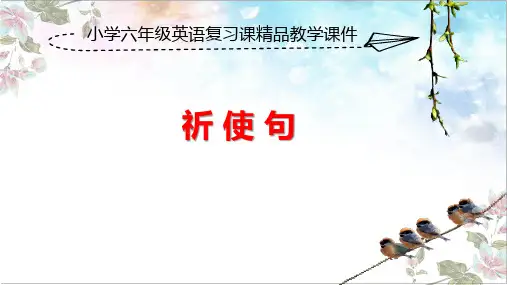


小学英语语法详解——祈使句什么是祈使旬?用于表达命令、请求、劝告、警告、禁止等的句子叫做析使句。
析使句的对象(即主语)是第二人称,也就是对“你(你们)”说的话,所以通常省略。
析使句的动词一般是动词原形,句末常使用句号或感叹号。
Go and wash your hands. 去洗你的手。
(命令)Be quiet, please. 请安静。
(请求)Be kind to the children. 对孩子们要和蔼。
(劝告)Watch your steps.走 路小心。
(警告)Look out! Danger! 小心!危险!(强烈警告)No smoking. 禁止吸烟。
(禁止)学习小贴士:偶尔祈使句也会把主语 “You” 表达出来,使对方听起来觉得柔和些,例如:You tell him, Mark.马克,你去告诉他。
一.祈使句的不同句型1.肯定结构1)动词原形(+宾语)+其他成分(简称为do型)Please write down your name. 请写下你的名字。
Open the window, please. 请开一下窗户。
2)Be 动词+表语(名词或形容词)+其他成分(简称为be型)Be a good boy!要做一个好孩子 !Be quick!快一点!3)Let+宾语+动词原形+其他成分(简称为let型) Let me help you. 让我来帮你。
Let us go to the garden.让我们去花园。
(let us可缩写成let’s)2.否定结构1)do 型句首加 don’t构成肯定:Close the door, please.请关门。
否定:Don’t close the door, plesee.请不要关门。
肯定:Look at me.看着我。
否定:Don’t look at me.不要看着我。
2)be 型也是在句首加 don’tDon’t be late for school!上学不要迟到!Don’t be sad.不要难过。

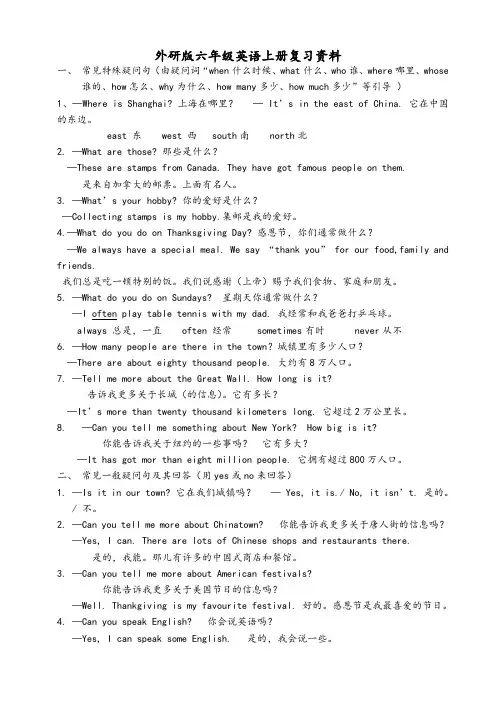
外研版六年级英语上册复习资料一、常见特殊疑问句(由疑问词“when什么时候、what什么、who谁、where哪里、whose谁的、how怎么、why为什么、how many多少、how much多少”等引导)1、—Where is Shanghai? 上海在哪里?— It’s in the east of China. 它在中国的东边。
east 东 west 西 south南 north北2. —What are those? 那些是什么?—These are stamps from Canada. They have got famous people on them.是来自加拿大的邮票。
上面有名人。
3. —What’s your hobby? 你的爱好是什么?—Collecting stamps is my hobby.集邮是我的爱好。
4.—What do you do on Thanksgiving Day? 感恩节,你们通常做什么?—We always have a special meal. We say “thank you” for our food,family and friends.我们总是吃一顿特别的饭。
我们说感谢(上帝)赐予我们食物、家庭和朋友。
5. —What do you do on Sundays? 星期天你通常做什么?—I often play table tennis with my dad. 我经常和我爸爸打乒乓球。
always 总是,一直 often 经常 sometimes有时 never从不6. —How many people are there in the town?城镇里有多少人口?—There are about eighty thousand people. 大约有8万人口。
7. —Tell me more about the Great Wall. How long is it?告诉我更多关于长城(的信息)。
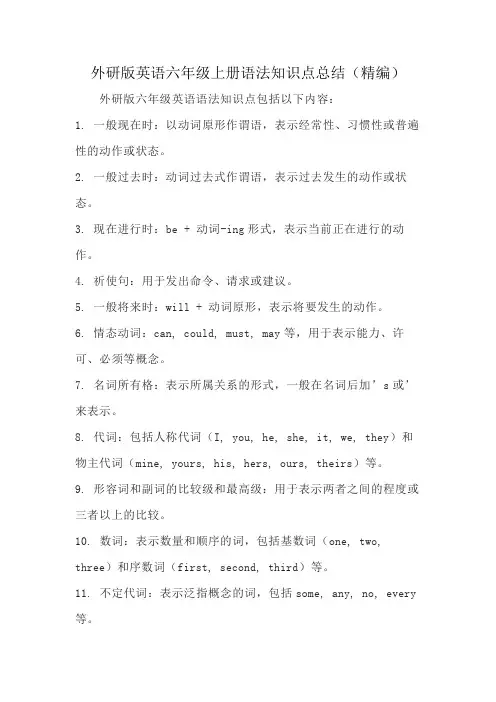
外研版英语六年级上册语法知识点总结(精编)外研版六年级英语语法知识点包括以下内容:1. 一般现在时:以动词原形作谓语,表示经常性、习惯性或普遍性的动作或状态。
2. 一般过去时:动词过去式作谓语,表示过去发生的动作或状态。
3. 现在进行时:be + 动词-ing形式,表示当前正在进行的动作。
4. 祈使句:用于发出命令、请求或建议。
5. 一般将来时:will + 动词原形,表示将要发生的动作。
6. 情态动词:can, could, must, may等,用于表示能力、许可、必须等概念。
7. 名词所有格:表示所属关系的形式,一般在名词后加’s或’来表示。
8. 代词:包括人称代词(I, you, he, she, it, we, they)和物主代词(mine, yours, his, hers, ours, theirs)等。
9. 形容词和副词的比较级和最高级:用于表示两者之间的程度或三者以上的比较。
10. 数词:表示数量和顺序的词,包括基数词(one, two, three)和序数词(first, second, third)等。
11. 不定代词:表示泛指概念的词,包括some, any, no, every 等。
12. 疑问词:用于提问的词,包括what, where, when, who, why等。
13. 定义性从句:用来对前面提到的名词或代词进行解释、说明的从句。
14. 时间状语从句:用于修饰主句,表示时间关系的从句。
15. 原因状语从句:用于修饰主句,表示原因关系的从句。
16. 结果状语从句:用于修饰主句,表示结果关系的从句。
17. 目的状语从句:用于修饰主句,表示目的关系的从句。
18. 条件状语从句:用于修饰主句,表示条件关系的从句。
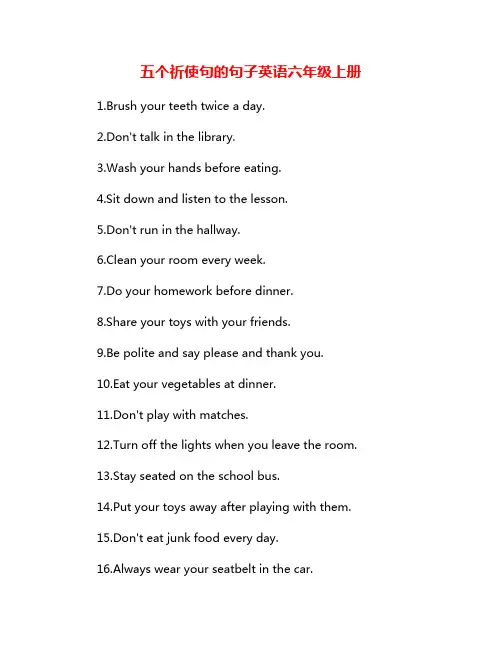
五个祈使句的句子英语六年级上册1.Brush your teeth twice a day.2.Don't talk in the library.3.Wash your hands before eating.4.Sit down and listen to the lesson.5.Don't run in the hallway.6.Clean your room every week.7.Do your homework before dinner.8.Share your toys with your friends.9.Be polite and say please and thank you.10.Eat your vegetables at dinner.11.Don't play with matches.12.Turn off the lights when you leave the room.13.Stay seated on the school bus.14.Put your toys away after playing with them.15.Don't eat junk food every day.16.Always wear your seatbelt in the car.17.Follow the rules in the classroom.18.Don't feed the animals at the zoo.19.Keep your hands to yourself.20.Be kind to others and help those in need.21.Brush your teeth after every meal.22.Always listen to your teacher in class.23.Don't forget to bring your textbooks to school.24.Respect your parents and elders.25.Help your classmates when they need assistance.26.Clean your room before going to bed.27.Be kind to animals and treat them with care.28.Don't talk while the teacher is speaking.29.Finish your homework before playing video games.30.Eat your vegetables to stay healthy.31.Remember to say please and thank you.32.Share your toys with your siblings.33.Put away your belongings after using them.34.Stay seated during class unless told otherwise.35.Get up early for school every morning.36.Wash your hands before eating a meal.37.Dress warmly in the winter to avoid getting sick.38.Take care of your personal hygiene.39.Don't run in the hallways of the school.40.Be polite and use good manners with everyone you meet.41.Brush your teeth before going to bed.42.Clean your room every Saturday.43.Do your homework carefully.44.Turn off the lights when you leave the room.45.Play outside with your friends.46.Listen to the teacher during class.47.Eat your vegetables for a healthy diet.48.Say thank you to show appreciation.49.Be kind to your classmates.50.Share your toys with your siblings.51.Wash your hands before meals.e kind words when speaking to others.53.Help your parents with household chores.54.Follow the rules in school.55.Be polite to elders.56.Take care of your belongings.57.Respect other people's opinions.58.Exercise regularly to stay healthy.59.Study hard to achieve good grades.60.Be responsible for your actions.61.Brush your teeth before bedtime.62.Pay attention to the teacher in class.plete your homework on time.64.Clean your room every weekend.65.Eat breakfast before going to school.66.Share your toys with your friends.67.Say "please" and "thank you".68.Listen carefully to your parents.69.Be kind to animals.70.Help your classmates when they need it.71.Respect your elders.72.Practice good manners at the table.73.Follow safety rules in the playground.74.Avoid talking loudly in the library.75.Keep your hands to yourself.e indoor voices inside the school building.77.Play nicely with your siblings.78.Put your toys away after you're done playing.79.Pick up trash and throw it in the bin.80.Remember to say sorry when you make a mistake.81.Please close the window.82.Keep quiet in the library.83.Don't play with fire.84.Be careful when crossing the road.85.Listen carefully to the teacher.86.Clean your room before going out.87.Don't forget to brush your teeth.88.Help your classmates with their work.89.Read the instructions before starting.90.Write your name at the top of the paper.91.Always say please and thank you.92.Share your toys with your friends.93.Don't run in the hallway.94.Put your hand up to ask a question.95.Respect your elders.96.Take turns when playing games.97.Follow the rules of the game.98.Check your work for mistakes.99.Practice your math skills every day.100.Remember to say sorry when you make a mistake. 101.Clean your room.102.Brush your teeth after meals.103.Do your homework before playing games. 104.Listen carefully to the teacher in class. 105.Be kind to your classmates.106.Help your parents with household chores. 107.Respect your elders.108.Wash your hands before eating.109.Stay organized with your school materials. 110.Be on time to all your classes.111.Follow the rules on the playground. 112.Share your toys with your friends.e kind words when speaking to others. 114.Be thankful for what you have.115.Think before you speak.116.Take care of your belongings.117.Say please and thank you.118.Apologize when you make a mistake.119.Be honest with others. 120.Always try your best.。
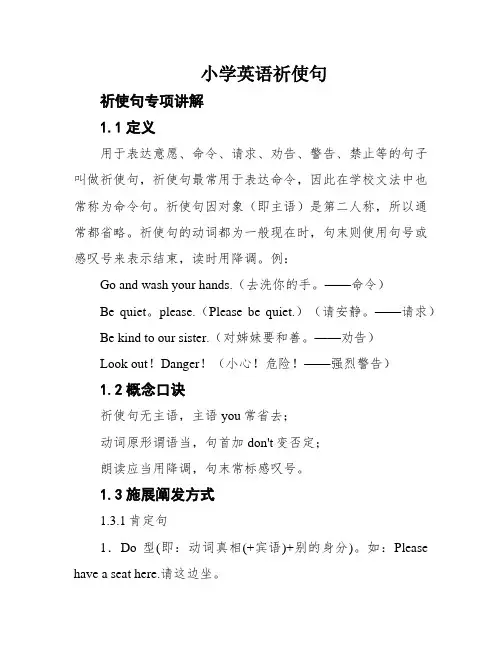
小学英语祈使句祈使句专项讲解1.1定义用于表达意愿、命令、请求、劝告、警告、禁止等的句子叫做祈使句,祈使句最常用于表达命令,因此在学校文法中也常称为命令句。
祈使句因对象(即主语)是第二人称,所以通常都省略。
祈使句的动词都为一般现在时,句末则使用句号或感叹号来表示结束,读时用降调。
例:Go and wash your hands.(去洗你的手。
——命令)Be quiet。
please.(Please be quiet.)(请安静。
——请求)Be kind to our sister.(对姊妹要和善。
——劝告)Look out!Danger!(小心!危险!——强烈警告)1.2概念口诀祈使句无主语,主语you常省去;动词原形谓语当,句首加don't变否定;朗读应当用降调,句末常标感叹号。
1.3施展阐发方式1.3.1肯定句1.Do型(即:动词真相(+宾语)+别的身分)。
如:Please have a seat here.请这边坐。
有的祈使句在乎思明白的情形下,动词可省略。
如:This way。
please。
= Go this way,please.请这边走。
2.Be型(即:Be +表语(名词或形容词)+其它成分)。
如:Be a good boy!要做一个好孩子!3.Let型(即:Let +宾语+动词原形+其它成分)。
如:Let me help you.让我来帮你。
1.3.2否定句1.Do型和Be型的否定式都是在句首加don't构成:如:Don't et me!不要忘记我!Don't be XXX!上学不要迟到!是系表布局——也就是没有行动动词可是有描述词的那种——利用Don't be有行动动词的就不克不及这么用,只能用Don't2.Let型的否定式有两种:“Don't + let +宾语+动词原形+其它成分”和“Let + 宾语+ not +动词原形+其它成分”。
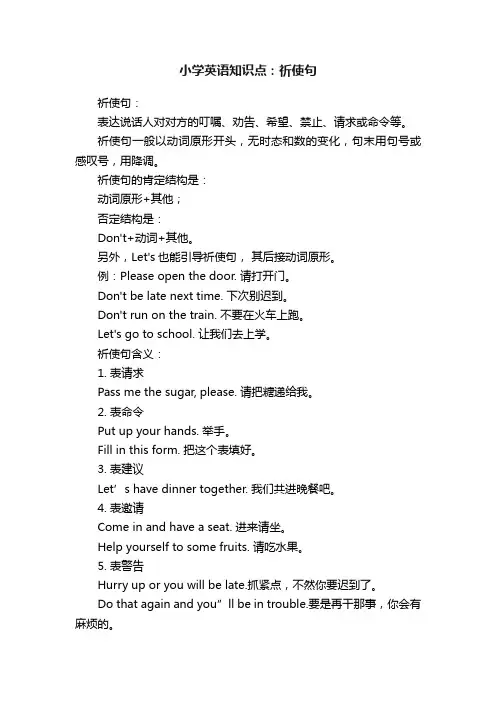
小学英语知识点:祈使句祈使句:表达说话人对对方的叮嘱、劝告、希望、禁止、请求或命令等。
祈使句一般以动词原形开头,无时态和数的变化,句末用句号或感叹号,用降调。
祈使句的肯定结构是:动词原形+其他;否定结构是:Don't+动词+其他。
另外,Let's也能引导祈使句,其后接动词原形。
例:Please open the door. 请打开门。
Don't be late next time. 下次别迟到。
Don't run on the train. 不要在火车上跑。
Let's go to school. 让我们去上学。
祈使句含义:1. 表请求Pass me the sugar, please. 请把糖递给我。
2. 表命令Put up your hands. 举手。
Fill in this form. 把这个表填好。
3. 表建议Let’s have dinner together. 我们共进晚餐吧。
4. 表邀请Come in and have a seat. 进来请坐。
Help yourself to some fruits. 请吃水果。
5. 表警告Hurry up or you will be late.抓紧点,不然你要迟到了。
Do that again and you”ll be in trouble.要是再干那事,你会有麻烦的。
6. 表禁止Don’t touch the exhibits.不要触摸展品。
Don’t play on the road.不要在马路上玩耍。
7. 表叮嘱Be sure to get there before nine. 务必在九点前赶到那里。
Take care not to catch cold. 小心别着凉了。
8. 表号召Workers of all countries, unite! 全世界工人阶级联合起来!9. 表祝愿Have a good trip. 祝你旅途愉快。
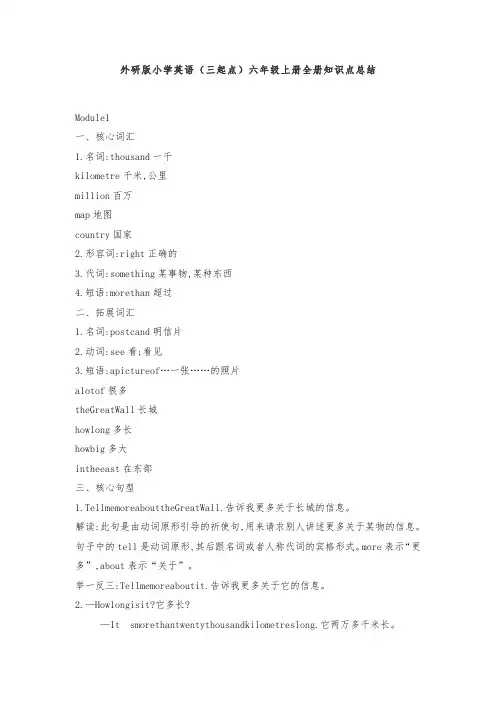
外研版小学英语(三起点)六年级上册全册知识点总结Module1一、核心词汇1.名词:thousand一千kilometre千米,公里million百万map地图country国家2.形容词:right正确的3.代词:something某事物,某种东西4.短语:morethan超过二、拓展词汇1.名词:postcand明信片2.动词:see看;看见3.短语:apictureof…一张……的照片alotof很多theGreatWall长城howlong多长howbig多大intheeast在东部三、核心句型1.TellmemoreabouttheGreatWall.告诉我更多关于长城的信息。
解读:此句是由动词原形引导的祈使句,用来请求别人讲述更多关于某物的信息。
句子中的tell是动词原形,其后跟名词或者人称代词的宾格形式。
more表示“更多”,about表示“关于”。
举一反三:Tellmemoreaboutit.告诉我更多关于它的信息。
2.—Howlongisit?它多长?—It smorethantwentythousandkilometreslong.它两万多千米长。
解读:此句是询问某物长度的句型。
howlong表示“多长”,既可以对某物的长短进行提问,也可以对时间的长短进行提问。
举一反三:—Howlongisit?它多长。
—It sabouttwometres.大约两米。
—Howlongdoesittakefromyourhometoschool?从你家到学校需要多长时间?—Ittakesabouttwohours.大约需要两小时。
3.CanyoutellmesomethingaboutNewYork?你能告诉我一些关于纽约的事吗?解读:此句是can引导的一般疑问句,用来请求他人做某事,语气比较委婉。
因为希望得到对方肯定的回答,所以用something。
举一反三:—Canyougoalongwithme?你能与我同行吗?—Sure.当然。
小学六年级英语语法祈使句,感叹句,疑问句[1] -------------------------------------------------------------------------------- 【网络综合【网络综合 - 小学六年级】小学六年级】一.祈使句一.祈使句Be careful! Please open your books. Let me have a try. Don ’t open the door. 口诀:祈使句无主语,主语you 常省去,动词原形当谓语,句首加don ’t 变否定。
变否定。
二.感叹句:用what 和how 引导,what 修饰的是名词,how 修饰的是副词或形容词。
修饰的是副词或形容词。
结构:What + a/an + 形+可数名词单数+(主语+谓语)!What+形+可数名词复数/不可数名词+(主语+谓语)!How+ 形/副 +(主语+谓语)!_____a fine day it is! (What )______useful work we have done! (What) ______careful my mother is! (How) _______delicious bread it is! (What) 做题技巧:从右往左看,先划掉感叹号前的主语和谓语,剩下的是名词就用what,剩下的是形容词或者副词就用how 。
当然名词还需辨别可数不可数来确定是否有冠词a/an 。
三.疑问句三.疑问句疑问句有一般疑问句,特殊疑问句,选择疑问句,反意疑问句。
疑问句有一般疑问句,特殊疑问句,选择疑问句,反意疑问句。
1. 一般疑问句:需要用yes 或no 来回答。
结构:助动词+主语+谓语谓语Have you locked the door? Yes, I have. Can you play the piano? Yes, I can. 2. 特殊疑问句:对句子中某一特殊部分提问的疑问句。
英语祈使句大全100句以下是100句典型的英语祈使句例句,仅供参考:1.Open the door. 开门。
2.Close the window. 关窗。
3.Bring me the book. 把那本书拿给我。
4.Follow me. 跟我来。
5.Sing the song again. 再唱一次这首歌。
6.Eat your dinner. 吃饭了。
7.Do your homework. 快做你的作业。
8.Go to bed. 去睡觉。
9.Get up now. 现在起床。
10.Don't be afraid. 别害怕。
11.Don't listen to him. 别听他的。
12.Be quiet, please. 请安静。
e here. 过来。
14.Dosome exercise. 做些运动。
15.Find the answer. 找出答案。
16.Clean the house. 打扫房间。
17.Sitdown please. 请坐。
18.Watch TV. 看电视。
19.Go to school. 去上学。
20.Be more careful. 多加小心。
21.Don't be late. 别迟到。
22.Don't speak loudly. 别大声说话。
23.Don't touch please. 请别碰。
24.Forget it. 算了。
25.Go and help him. 去帮助他。
26.Draw a picture. 画幅画。
27.Don't complain anymore. 别再抱怨了。
28.Don't forget it. 别忘了。
29.Don't worry. 别担心。
30.Eat some more. 再多吃一点。
31.Follow my orders. 听我指挥。
32.Go and see for yourself. 自己去看。
六年级英语祈使句单选题50题1.Don't run in the classroom!A.Run in the classroom.B.Don't walk in the classroom.C.Sit down in the classroom.答案:A 错,在教室里跑是不对的行为;B 错,题干是不要跑而不是不要走;C 错,题干说的不是坐下。
本题考查祈使句的否定形式,Don't run in the classroom 表示不要在教室里跑。
2.Close the window,please!A.Open the window.B.Close the door.C.Don't close the window.答案:A 错,题干是关窗不是开窗;B 错,题干是关窗不是关门;C 错,题干是要求关窗不是不关窗。
本题考查祈使句的肯定形式,Close the window,please!表示请关窗。
3.Don't talk loudly!A.Talk loudly.B.Talk quietly.C.Sing loudly.答案:A 错,题干要求不要大声说话;C 错,题干说的不是大声唱歌;B 对,与大声说话相对应的是小声说话。
本题考查祈使句的否定形式,Don't talk loudly!表示不要大声说话。
4.Be quiet!A.Be noisy.B.Be happy.C.Be sad.答案:A 错,题干要求安静不是吵闹;B 错,题干说的不是开心;C 错,题干说的不是伤心。
本题考查祈使句的肯定形式,Be quiet!表示安静。
5.Stand up,please!A.Sit down.B.Stand on.C.Lie down.答案:A 错,题干要求站起来不是坐下;B 错,没有stand on 这种常用表达;C 错,题干说的不是躺下。
本题考查祈使句的肯定形式,Stand up,please!表示请站起来。
句子三: 感叹句和祈使句时间:40分钟满分:60分一、根据提示写出单词, 我会填。
(12分)1. [山东省聊城市]Don't c(哭泣). I can help you.2. [山东省聊城市]Welcome h(回家)!3. [河南省汝州市]Keep on ____________(练习)Chinese in the UK.4. [河南省焦作市]Good luck for the _________________(将来, 未来).5. What a ____________! (肮脏, 凌乱).6. Here is your dinner. ____________(享用, 享受)your meal!二、单项选择。
(10分)( )1. [广西壮族自治区桂林市]Don't________in the classroom!A. talkingB. talksC. talk( )2. [广西壮族自治区桂林市]— ______, Tom. You've been running for fortyminutes!—I'm not tired.A. Have a restB. Pick it upC. Help yourself( )3. [山东省德州市]________beautiful picture!A. WhatB. WhataC. How a( )4. [四川省眉山市]—Happy birthday!—________A. Thank you.B. The same to you.C. OK.( )5. [四川省雅安市]—Best ________ to you.—Thank you.A. wishB. wishesC. wishing三、用所给词的适当形式填空。
(10分)1. Simon,____________(come)and_________________(help)us.2.____________(is)careful, Sam! The balloons are flying away.3. Let ____________(we)write lots of emails to each other.4. Please ____________(write)a word on the blackboard.5. ____________(wish)you____________(happy)every day.四、连词成句。